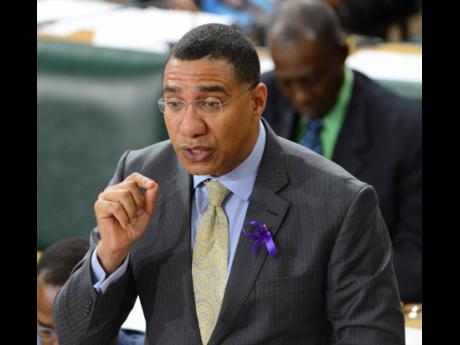Holness says STEM schools will be performance-based
Making a pitch for the establishment of an alternative education system to focus on science, technology, engineering and mathematics (STEM), Prime Minister Andrew Holness yesterday said the current teaching and learning process was “autocratic” and unfriendly to “exploratory learning”.
The STEM system, which will run parallel to the current process, will be blanketed under new legislative framework, a rejection of the 1980 Education Act that governs the administration of the public-school system, Holness said on Nationwide News Network yesterday.
“The STEM schools have to be performance-based, and the Education Act is not set up for a performance-based system. The STEM schools have to be operated as well under a different institutional management mechanism. They have to be far more accountable. They have to have performance-based contracts for the teachers … ,” Holness told journalist Cliff Hughes.
The prime minister said the system must be more embracing of science and technology and abandon “the kind of autocratic learning styles that plague our schools”.
OUTDATED PRACTICES
Holness, a former education minister, further justified the decision to create a legislative framework outside of the current code, saying that much of the Education Act was tied to “a lot of politics and a lot of culture” and practices that are outdated.
Successive governments have faltered in their attempts to fix the current under-resourced, teach-by-rote, and indiscipline-prone system, which has led to low yields in a significant percentage of primary and secondary schools.
Some traditional secondary and a handful of the new secondary schools which were converted to high schools have managed to excel in STEM-based subjects. Significant financial resources have been expended to improve laboratory facilities, securing the services of specialist teachers and extra class time, including weekend classes, to attain good results.
Further advancement, however, has been hit by teacher migration, especially to the United Kingdom, the United States and, more recently, the Middle East.
Criticism of Holness’ plan came fast and furious.
The Jamaica Teachers’ Association called for greater focus to be placed on improving STEM performance in all Jamaican schools instead of creating specialist institutions. The association said the move could see a greater exodus of the already limited number of STEM teachers from the general school system to work in the proposed academies.
The prime minister admitted that where such academies have existed, an alternative system has to be created, but suggested that there will be an ultimate convergence in the future. This system will also be competition based, the prime minister said.
Holness said there must be value for money for government expenditure in the sector, citing many schools were struggling.
He said that high standards must be maintained, instead of what was an acceptance of compromise.

